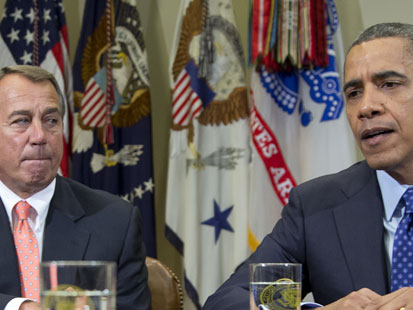CAIRO (Reuters) - Protests by Islamists allied to President Mohamed Mursi forced Egypt's highest court to adjourn its work indefinitely on Sunday, intensifying a conflict between some of the country's top judges and the head of state.
The Supreme Constitutional Court said it would not convene until its judges could operate without "psychological and material pressure", saying protesters had stopped the judges from reaching the building.
Several hundred Mursi supporters had protested outside the court through the night ahead of a session expected to examine the legality of parliament's upper house and the assembly that drafted a new constitution, both of them Islamist-controlled.
The cases have cast a legal shadow over Mursi's efforts to chart a way out of a crisis ignited by a November 22 decree that temporarily expanded his powers and led to nationwide protests against him and his Muslim Brotherhood group.
The court's decision to suspend its activities appeared unlikely to have any immediate impact on Mursi's drive to get the new constitution passed in a national referendum on December 15.
Judges supervise voting in Egypt, and Mursi will need them to oversee the referendum.
But in a blow to the president, an influential body representing judges decided on Sunday not to oversee the vote, the state news agency reported. The Judges' Club's decisions are not binding on members, however.
Vice President Mahmoud Mekky said on Sunday he was confident the judges would perform that role, despite calls by Mursi's critics in the judiciary for a boycott.
Three people have been killed and hundreds wounded in protests and counter-demonstrations over Mursi's decree.
At least 200,000 of Mursi's supporters attended a rally at Cairo University on Saturday. His opponents are staging an open-ended sit-in in Cairo's Tahrir Square, the cradle of the uprising that toppled Hosni Mubarak in February 2011.
The National Salvation Front, an alliance of liberal, leftist and socialist opposition groups, called for protests in Tahrir Square on Tuesday against Mursi holding the referendum on what it branded an "illegitimate constitution".
Mursi and the Muslim Brotherhood, which propelled him to power in a June election, hope to end the crisis by pushing through the new constitution hastily adopted by the drafting assembly on Friday. The next day the assembly handed the text to Mursi, who called the referendum and urged Egyptians to vote.
"The Muslim Brotherhood is determined to go ahead with its own plans regardless of everybody else. There is no compromise on the horizon," said Hassan Nafaa, a professor of political science at Cairo University.
DEEP SUSPICION
Outside the Supreme Constitutional Court, Muslim Brotherhood supporters rallied behind the referendum date. "Yes to the constitution," said a banner held aloft by one protester. Chants demanded the "purging of the judiciary".
The interior minister told the head of the court that the building was accessible and that the protests were peaceful, according a statement from the ministry.
The protest reflected the deep suspicion harbored by Egypt's Islamists towards a court they see as a vestige of the Mubarak era. The same court ruled in June to dissolve the Muslim Brotherhood-led lower house of parliament.
Since then, several legal cases have challenged the legitimacy of the upper house of parliament and the 100-member constituent assembly that wrote the constitution.
Those against the upper house have focused on the legality of the law by which it was elected, while the constitutional assembly has faced a raft of court cases alleging that the way it was picked was illegal.
Mursi believes securing approval for the new constitution in a popular referendum will bury all arguments on the legality of the constituent assembly, as well as controversy over the text it worked through the night to finish on Friday.
It will also override the November 22 decree that drew concern from Western governments and a rebellion by sections of the judiciary. The decree shielded Mursi from judicial oversight.
While the Islamists' critics, including representatives of the Christian minority, have accused the Brotherhood of trying to hijack the constitution, investors appear to have seen Mursi's moves as a harbinger of stability. They were also relieved that Saturday's mass Islamist protest went off calmly.
The main stock market index, which lost a tenth of its value in response to Mursi's November 22 decree, rallied more than 2 percent when the market opened on Sunday.
"The events that took place through the weekend, from the approval of the final draft of the constitution and the president calling a referendum, gave some confidence to investors that political stability is on track," said Mohamed Radwan of Pharos Securities, an Egyptian brokerage.
OPPOSITION INFURIATED
But opposition parties have been infuriated by what they see as the Brotherhood's attempt to ram through a constitution that does not enjoy national consensus. Mursi's opponents warn of deeper polarization ahead.
Liberal figures, including former Arab League chief Amr Moussa, pulled out of the constituent assembly last month, as did Christian representatives.
The draft constitution contains Islamist-flavored language which opponents say could be used to whittle away human rights and stifle criticism. It forbids blasphemy and "insults to any person", does not explicitly uphold women's rights and demands respect for "religion, traditions and family values".
New York-based Human Rights Watch said the draft constitution protected some rights while undermining others.
The text limits presidents to two four-year terms, requires parliamentary approval for their choice of prime minister, and introduces some civilian oversight of the military - although not enough for critics. Mubarak ruled for three decades.
Mursi described it as a constitution that fulfilled the goals of the revolution that ended Mubarak's rule. "Let everyone -- those who agree and those who disagree -- go to the referendum to have their say," he said.
The Islamists are gambling that they will be able to secure a "Yes" vote by mobilizing their core support base.
(Writing by Tom Perry; Editing by Alistair Lyon and Roger Atwood)











